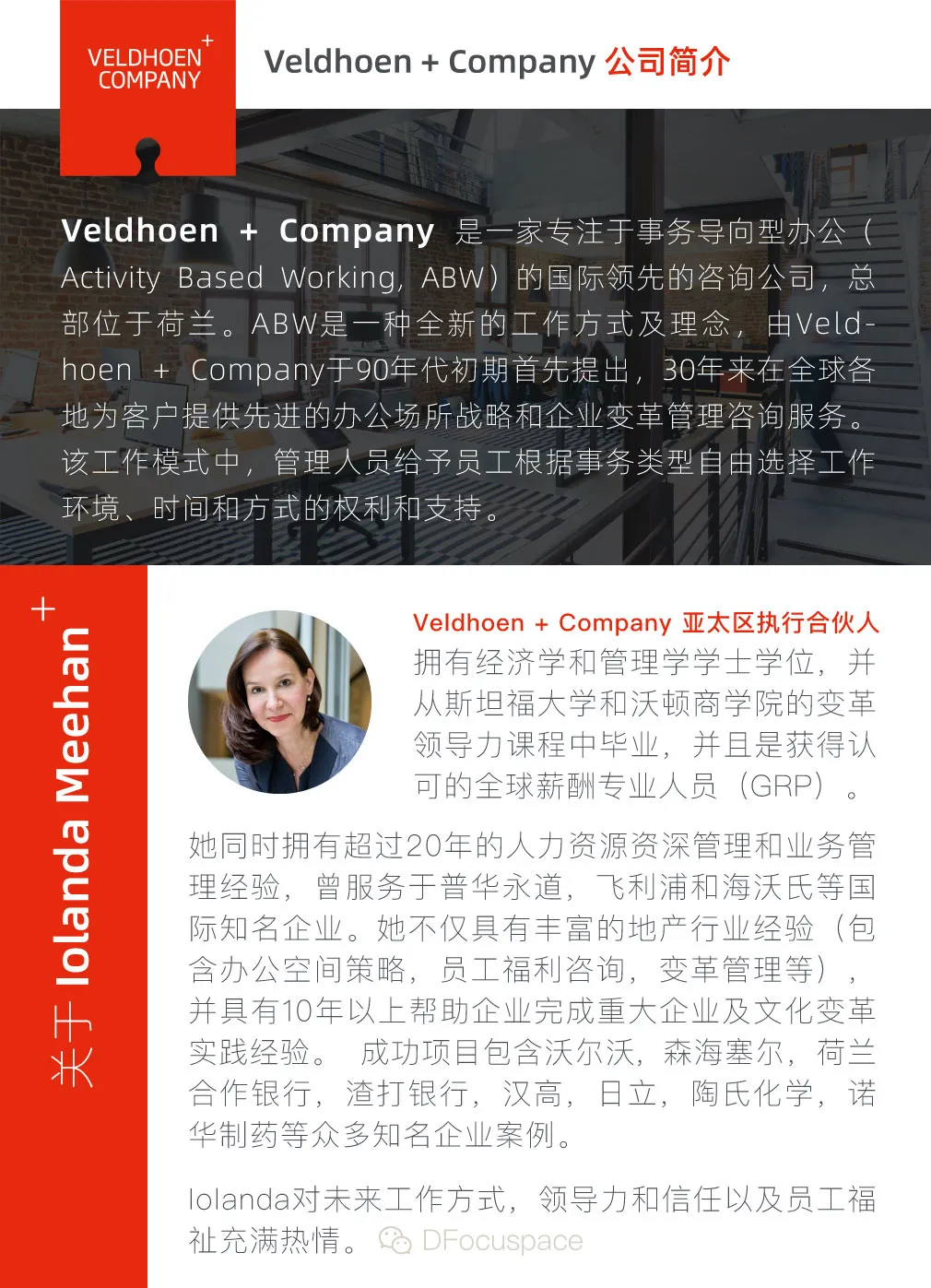导语
本期,我们荣幸邀请到了ABW理念创始方、国际知名办公空间变革引领者Veldhoen + Company公司的亚太区合伙人—— Iolanda Meehan女士,为大家深度解读ABW办公模式,了解办公变革中的难点、误区,并为空间管理者提供大量实践经验,文末更有免费白皮书下载福利,一起阅读吧!

Q
A
DFocus
耘申科技
Iolanda Meehan
Veldhoen + Company
亚太区执行合伙人
PART I
Within the past few years, ABW has gained lots of attention in China. As the pioneer in ABW consultancy, what is your main focus when helping companies implement an ABW environment?
在过去几年间,ABW工作模式在中国得到了广泛关注。作为此领域的权威咨询顾问,您在帮助企业打造ABW环境时的主要关注点是什么?
作为ABW领域的专家,我们与企业合作时会重点聚焦于让他们推行一种新的工作方式。这总是从了解人们为什么想要改变工作方式开始的。ABW的核心理论是关于员工应该被充分信任和赋能去完成工作,并且不需要依赖于特定的时间和空间。这就涉及到物理空间、网络科技和员工行为这三大因素。因此,当我们与企业展开合作最初,主要的重点是让他们理解为什么想要改变工作方式,一旦弄清楚了原因并确认其与商业战略保持一致后,我们就可以帮助他们发掘更能改善当前工作和工作场所的策略。match
The ABW concept study in Europe has been around for around 30 years. In the last 5 to 6 years, we are seeing more and more interest from Asia-based companies, especially China-based companies.
在欧洲,ABW的概念研究已进行了约30年;在过去的5至6年中,我们也看到越来越多的亚洲公司(尤其中国公司)对此感兴趣。

PART II
DFocus: Veldhoen + Company has implemented hundreds of projects globally. What industries are key targets for ABW Transition?
Veldhoen + Company已在全球实施了数百个项目,哪些行业是ABW变革的目标群体?
在过去的30年中,我们在全球范围内开展了约600个不同的项目。我认为没有哪个特定行业表现得比其他行业更适合ABW模式。通过与各行业内不同企业的合作经验来看,我们的优势能更好的体现在那些给予员工、人才更高关注度和更多自治权利等方面的企业和其领导者身上。
About 10-12 years ago, we saw big up-take of activity-based working in the financial services sector e.g. banks and insurance companies. And it was not because it was trendy in the industry but also the industry was facing fierce competition in regard to talent attraction. So, changing the way people work, changing the environment that you offer, giving a higher degree of autonomy to your employees became a way to attract talent.
约10到12年前,我们看到金融业、银行和保险公司大量采用了ABW工作模式,这并不仅仅是因为ABW在这些行业中很流行,还因为当时金融行业正面临着激烈的人才竞争。因此,改变人们的工作方式、改变企业提供办公环境、赋予员工更多自主权都成为了吸引人才的手段。
In the last 5-6 years, we have seen quite some interest from pharma and medical devices companies. ABW is not any more relevant for this industry compared to others, but again pharma and medical device industries were facing quite some talent competition, since they started to compete with the tech organization for talent. More pharma companies started to embrace activity-based working to attract the right talent, to retain them and to drive more innovation. Actually some of the leading pharma companies we have worked with have embraced the activity-based thinking holistically, and are currently running deep organization and culture changes fueled by the principles of distributed teams, empowered employees and trust – which are very much sourced in the activity-based philosophy.
在过去的5-6年中,我们看到制药和医疗设备类公司对ABW表现出强烈兴趣。同样的,这并不是因为它们的行业本身,而是跟之前的金融业一样,制药和医疗设备行业也面临激烈的人才竞争,因为他们开始要与科技公司竞争人才了。越来越多的制药公司开始采用ABW办公模式以吸引合适的人才、留住人才并推动进一步的创新。实际上,我们与之合作的一些领先制药公司已经全面接受了事务导向型的思想理念,并且目前正在进行深层次的组织和文化变革,这些变革是由分布式团队,赋权员工和信任的原则推动的,这些正是来源于事务导向型办公的理念精华。
We also work with government, institutions, hospitals and city councils. So I would not say there is one industry which fits activity-based working better than others. Because there is no one formula. The formula of activity-based working is very organizational specific.
我们还与政府,公共机构,医院和市议会合作过。所以我不认为有哪一个行业比其他行业更适合ABW,因为ABW方案没有统一的公式,都是针对某个企业量身定做的。
PART III
DFocus: Veldhoen + Company has implemented hundreds of projects globally. What industries are key targets for ABW Transition?
Veldhoen + Company已在全球实施了数百个项目,哪些行业是ABW变革的目标群体?
在过去的30年中,我们在全球范围内开展了约600个不同的项目。我认为没有哪个特定行业表现得比其他行业更适合ABW模式。通过与各行业内不同企业的合作经验来看,我们的优势能更好的体现在那些给予员工、人才更高关注度和更多自治权利等方面的企业和其领导者身上。
About 10-12 years ago, we saw big up-take of activity-based working in the financial services sector e.g. banks and insurance companies. And it was not because it was trendy in the industry but also the industry was facing fierce competition in regard to talent attraction. So, changing the way people work, changing the environment that you offer, giving a higher degree of autonomy to your employees became a way to attract talent.
约10到12年前,我们看到金融业、银行和保险公司大量采用了ABW工作模式,这并不仅仅是因为ABW在这些行业中很流行,还因为当时金融行业正面临着激烈的人才竞争。因此,改变人们的工作方式、改变企业提供办公环境、赋予员工更多自主权都成为了吸引人才的手段。
In the last 5-6 years, we have seen quite some interest from pharma and medical devices companies. ABW is not any more relevant for this industry compared to others, but again pharma and medical device industries were facing quite some talent competition, since they started to compete with the tech organization for talent. More pharma companies started to embrace activity-based working to attract the right talent, to retain them and to drive more innovation. Actually some of the leading pharma companies we have worked with have embraced the activity-based thinking holistically, and are currently running deep organization and culture changes fueled by the principles of distributed teams, empowered employees and trust – which are very much sourced in the activity-based philosophy.
在过去的5-6年中,我们看到制药和医疗设备类公司对ABW表现出强烈兴趣。同样的,这并不是因为它们的行业本身,而是跟之前的金融业一样,制药和医疗设备行业也面临激烈的人才竞争,因为他们开始要与科技公司竞争人才了。越来越多的制药公司开始采用ABW办公模式以吸引合适的人才、留住人才并推动进一步的创新。实际上,我们与之合作的一些领先制药公司已经全面接受了事务导向型的思想理念,并且目前正在进行深层次的组织和文化变革,这些变革是由分布式团队,赋权员工和信任的原则推动的,这些正是来源于事务导向型办公的理念精华。
We also work with government, institutions, hospitals and city councils. So I would not say there is one industry which fits activity-based working better than others. Because there is no one formula. The formula of activity-based working is very organizational specific.
我们还与政府,公共机构,医院和市议会合作过。所以我不认为有哪一个行业比其他行业更适合ABW,因为ABW方案没有统一的公式,都是针对某个企业量身定做的。